Unit 2 I'll help to clean up the city parks. Section B 2a~2e课件(共33张PPT) 人教新目标(Go for it)版八年级下册
文档属性
| 名称 | Unit 2 I'll help to clean up the city parks. Section B 2a~2e课件(共33张PPT) 人教新目标(Go for it)版八年级下册 | 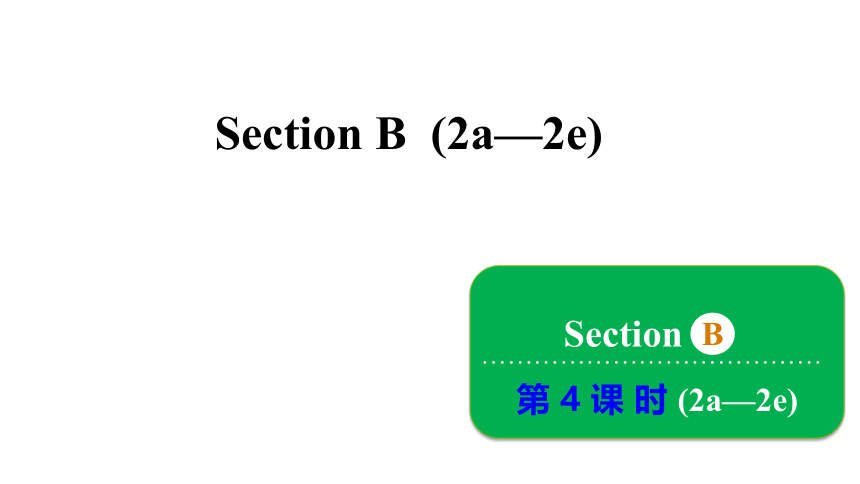 | |
| 格式 | pptx | ||
| 文件大小 | 5.8MB | ||
| 资源类型 | 教案 | ||
| 版本资源 | 人教新目标(Go for it)版 | ||
| 科目 | 英语 | ||
| 更新时间 | 2024-05-11 16:11:37 | ||
图片预览

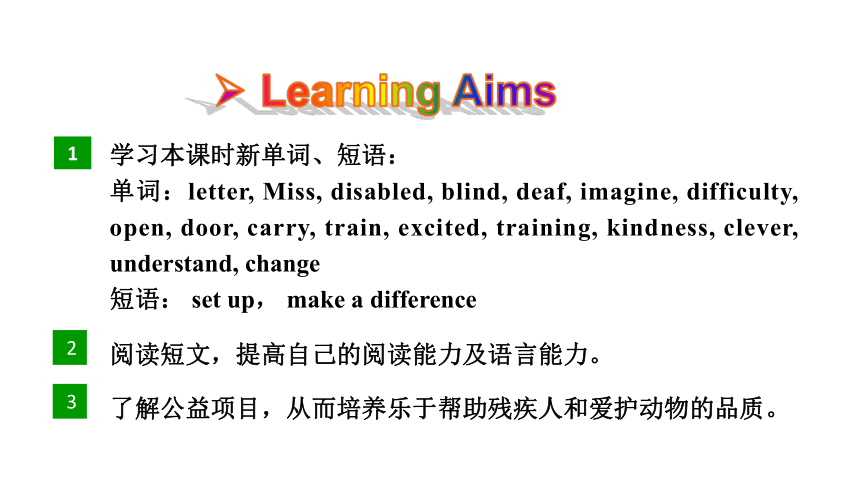
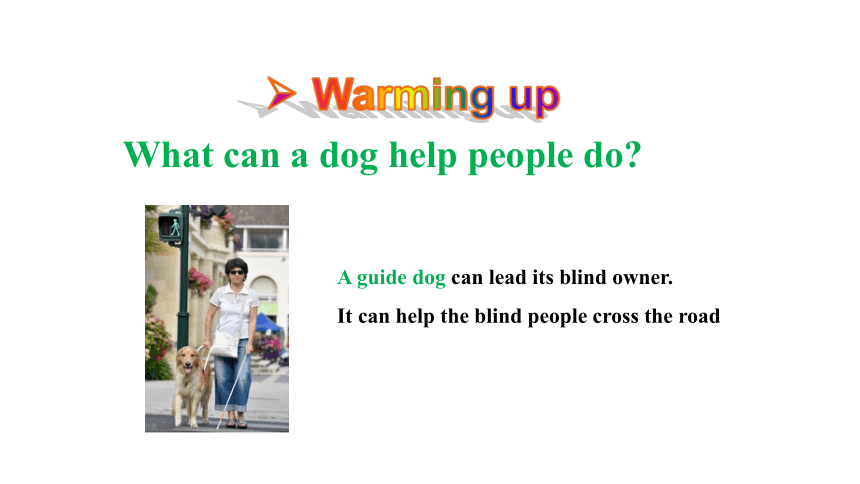
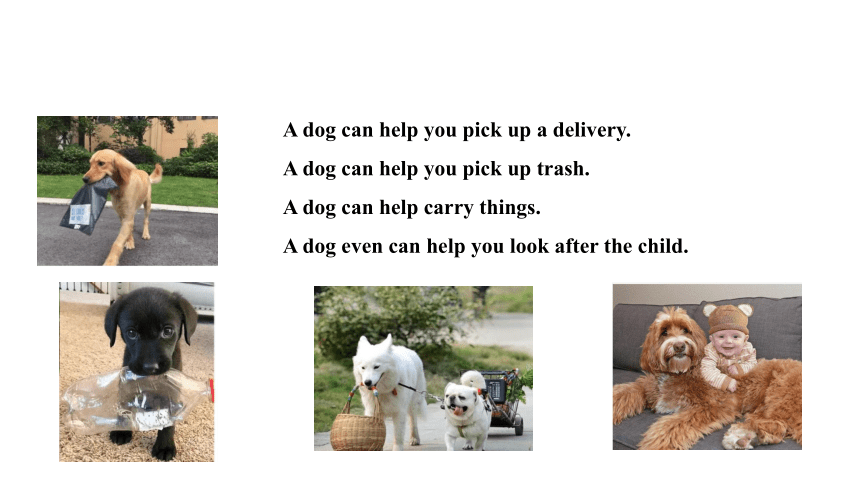
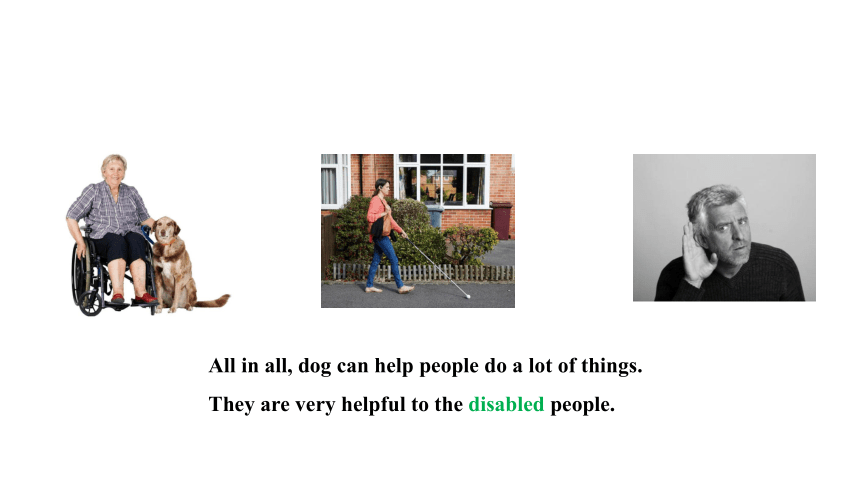
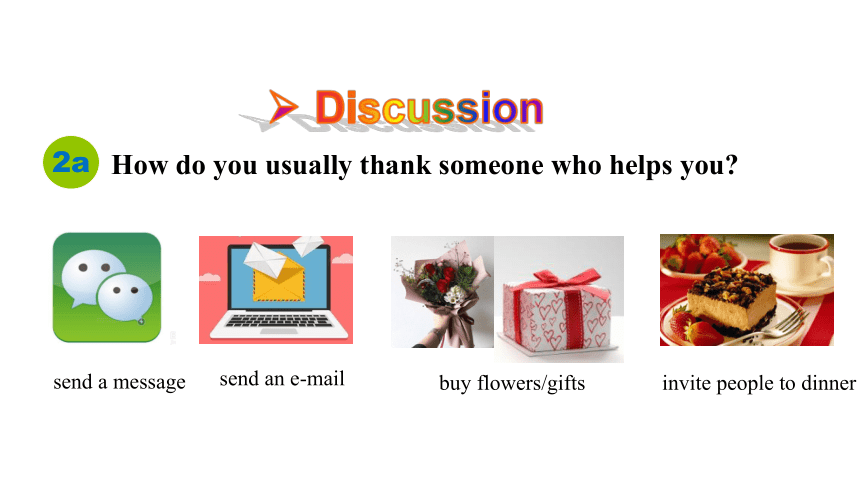
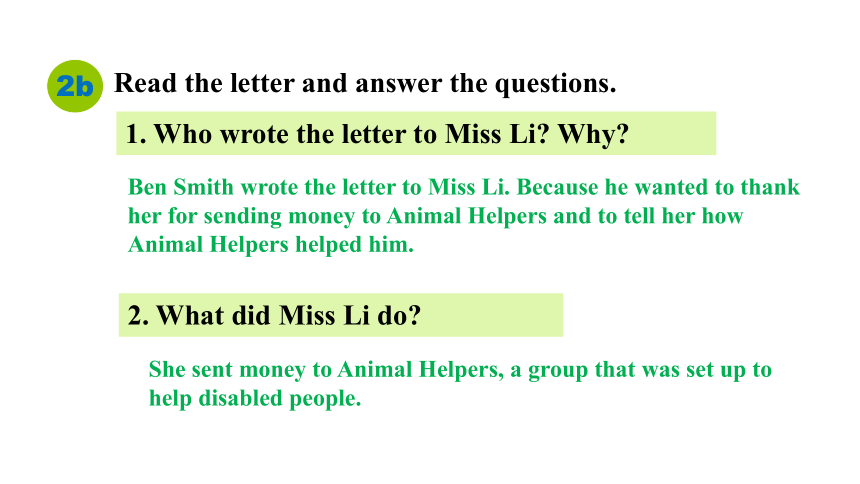
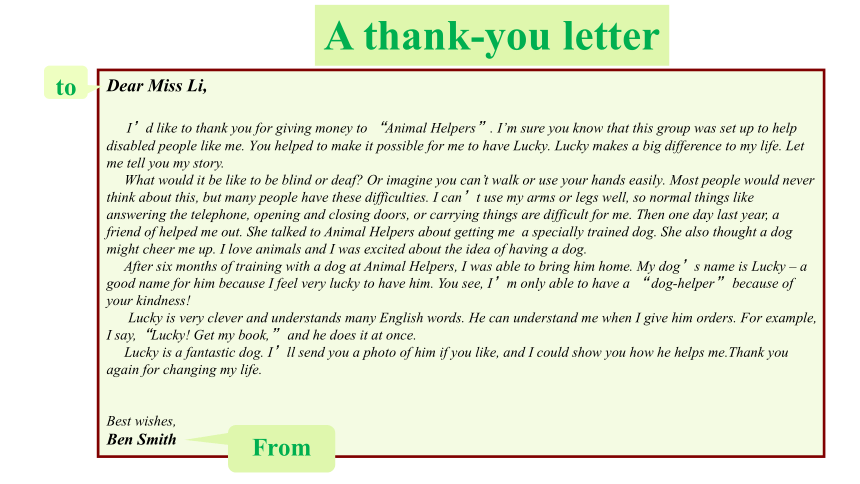
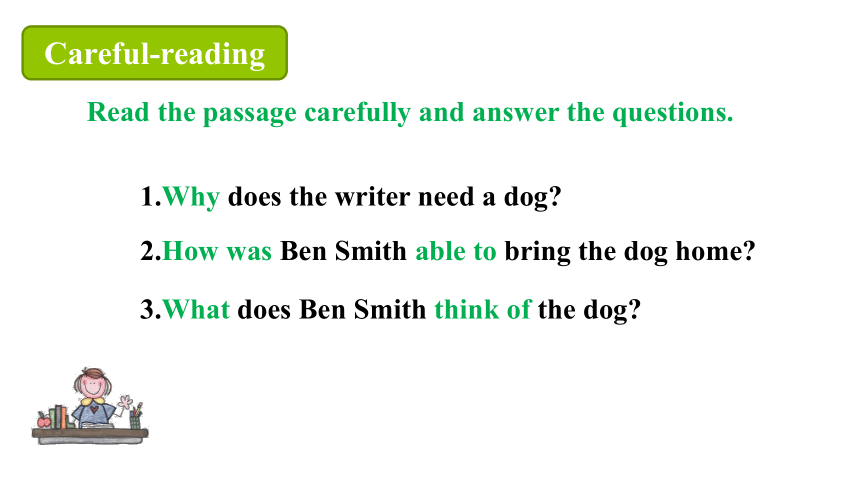
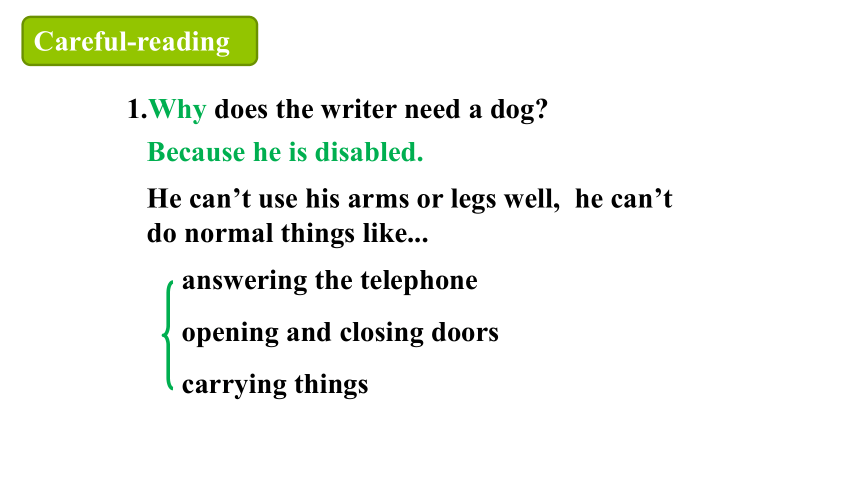
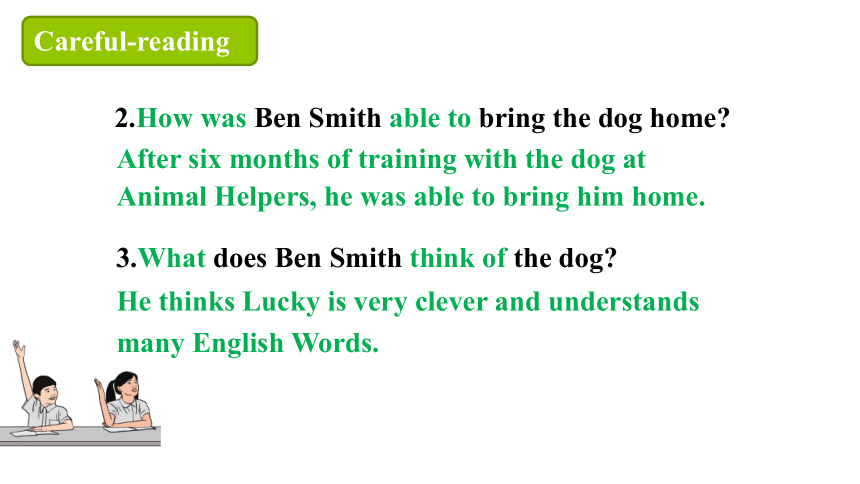
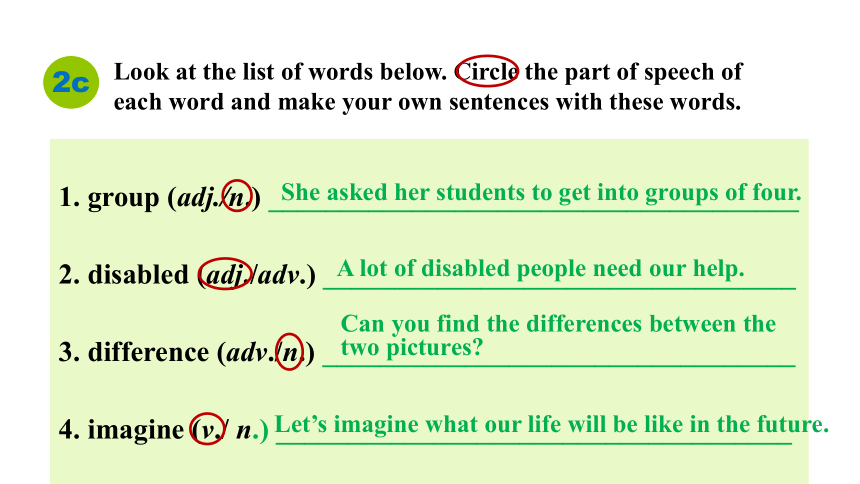
文档简介
(共33张PPT)
Section
Section B (2a—2e)
第 4 课 时 (2a—2e)
…………………………………
B
1
学习本课时新单词、短语:
单词:letter, Miss, disabled, blind, deaf, imagine, difficulty, open, door, carry, train, excited, training, kindness, clever, understand, change
短语: set up, make a difference
阅读短文,提高自己的阅读能力及语言能力。
2
Learning Aims
了解公益项目,从而培养乐于帮助残疾人和爱护动物的品质。
3
Warming up
What can a dog help people do
A guide dog can lead its blind owner.
It can help the blind people cross the road
A dog can help you pick up a delivery.
A dog can help you pick up trash.
A dog can help carry things.
A dog even can help you look after the child.
All in all, dog can help people do a lot of things.
They are very helpful to the disabled people.
Discussion
2a
How do you usually thank someone who helps you
send a message
send an e-mail
buy flowers/gifts
invite people to dinner
Read the letter and answer the questions.
1. Who wrote the letter to Miss Li Why
Ben Smith wrote the letter to Miss Li. Because he wanted to thank her for sending money to Animal Helpers and to tell her how Animal Helpers helped him.
2. What did Miss Li do
She sent money to Animal Helpers, a group that was set up to help disabled people.
2b
Dear Miss Li,
I’d like to thank you for giving money to “Animal Helpers”. I’m sure you know that this group was set up to help disabled people like me. You helped to make it possible for me to have Lucky. Lucky makes a big difference to my life. Let me tell you my story.
What would it be like to be blind or deaf Or imagine you can’t walk or use your hands easily. Most people would never think about this, but many people have these difficulties. I can’t use my arms or legs well, so normal things like answering the telephone, opening and closing doors, or carrying things are difficult for me. Then one day last year, a friend of helped me out. She talked to Animal Helpers about getting me a specially trained dog. She also thought a dog might cheer me up. I love animals and I was excited about the idea of having a dog.
After six months of training with a dog at Animal Helpers, I was able to bring him home. My dog’s name is Lucky – a good name for him because I feel very lucky to have him. You see, I’m only able to have a “ dog-helper” because of your kindness!
Lucky is very clever and understands many English words. He can understand me when I give him orders. For example, I say,“Lucky! Get my book,” and he does it at once.
Lucky is a fantastic dog. I’ll send you a photo of him if you like, and I could show you how he helps me.Thank you again for changing my life.
Best wishes,
Ben Smith
to
A thank-you letter
From
1.Why does the writer need a dog
2.How was Ben Smith able to bring the dog home
3.What does Ben Smith think of the dog
Careful-reading
Read the passage carefully and answer the questions.
1.Why does the writer need a dog
Because he is disabled.
answering the telephone
opening and closing doors
carrying things
He can’t use his arms or legs well, he can’t do normal things like...
Careful-reading
2.How was Ben Smith able to bring the dog home
After six months of training with the dog at Animal Helpers, he was able to bring him home.
3.What does Ben Smith think of the dog
He thinks Lucky is very clever and understands many English Words.
Careful-reading
Look at the list of words below. Circle the part of speech of each word and make your own sentences with these words.
1. group (adj./n.) _____________________________________
2. disabled (adj./adv.) _________________________________
3. difference (adv./n.) _________________________________
4. imagine (v./ n.) ____________________________________
She asked her students to get into groups of four.
A lot of disabled people need our help.
Can you find the differences between the two pictures
Let’s imagine what our life will be like in the future.
2c
5. difficulties (n./ adj.) _______________________________
6. normal (adv./ adj.) ________________________________
7. training (adv./n.) _________________________________
8. kindness (n./ v.) __________________________________
The company has got itself into difficulties.
Sunday is a normal working day for me.
Nurses have several years of training.
She always treats people with kindness.
Miss Li
Ben Smith
Lucky
Animal Helpers
can get
trains
sent
is
unable to move well.
money to Animal. Helpers.
animals like Lucky.
things for disabled people.
SUBJECT
VERB
OBJECT
Use the information in the letter to make true sentences by matching the different parts.
2d
Discuss the questions with a partner.
In what other ways do you think dogs are able to
help people
find drugs / missing persons
hunt
protect people from danger
keep people from being lonely
have fun
2e
2. What other animals can we train to help people
sending letters by pigeons
The cattle can plough fields.
The horse can carry goods.
Ben Smith is a _________ man. He has many __________ in his life. He can’t _____ his _____ or legs well. Some __________ things like ___________the telephone, opening and closing the doors, or ________ things _____ difficult for him. __________, Miss Li, a kind woman, ______some money to Animal Helpers and that _______it ________for Ben ______ ______Lucky.
disabled
difficulties
use
arms
answering
carrying
Luckily
gave
made
possible
normal
are
to have
Retell the main idea of the passage by filling in the blanks.
Post-reading
“Lucky”, the dog ________, is a __________dog. He is very ___________and ____________many English words. It can understand him when he gives him __________. Lucky makes a big __________ ______his life.
helper
fantastic
clever
understands
orders
difference to
Language points
1. … was set up to help disabled people like me.
set up 建起;设立
We decided to set up camp for the night. 我们决定搭帐篷过夜。
拓展:
另外set up home 还有 “建立家园,成家”之意。
2. You helped to make it possible for me to have Lucky.
make it + adj. (for sb.)+ to do sth.
it 是形式宾语,to do sth. 是真正的宾语。
Spaceships make it possible to travel to the moon.
宇宙飞船使去月球旅行成为可能。
3. Lucky makes a big difference to my life.
make a difference 有影响;有作用
Anything that we can do will make a difference.
我们所能做的一切都会有所不同。
make a difference to 对 ... …产生影响
A teacher can make a difference to the lives of his / her students.
教师能够影响学生的一生。
imagine v. 想像,预料,设想
后面可以接名词作宾语。
I can’t imagine life without friendship now.
我现在无法想像没有友谊的生活。
派生:imagination n. 想象力;想像
4. Or imagine you can’t walk or use ….
拓展:
imagine还可以用于以下结构中:
√ imagine (sb.) doing sth.意为“想像(某人)做某事”。
I can’t imagine (myself) dancing in front of so many people.
我无法想像(自己)在那么多人面前跳舞。
√ imagine sb. / sth. (+ to be) + 形容词、名词或介词短语等,意为“想像某人/ 某物……”。
That boy always imagines himself (to be) a pilot.
那个男孩总是想像自己是一名飞行员。
√ imagine + 从句,意为“想像/猜测/料想……”。
I imagine (that) you are very tired.
我猜想你很累了。
carry无方向性,含“负重”之意,一般指随身携带,如手提、肩扛等。
These bags carry easily.
这些袋子便于携带。
5. … or carrying things are difficult for me.
辨析: bring / take / carry / fetch / get
这五个词都表示“取,拿,运送”之意,但动作的方向和具体含义不同。
(1)bring指把人或物从别处带到说话人所在的地方。
(2)take指把人或物从说话人所在的地方带到别处去。
(3)carry无方向性,含“负重”之意,一般指随身携带,如手提、肩扛等。
(4)fetch指从说话者所在的地方到别处去把人或物带回来。
(5)get与fetch同义,但比fetch口语化。
train v. 训练;培训
You’ll have to train hard before the next match.
在下一场比赛之前你必须好好培训。
派生:trained adj. 训练过的
training n. 训练;培训
6. … getting me a special trained dog.
excited adj. 兴奋的, 通常作表语,用于修饰人。
She was excited about going to the party. 她因去参加聚会而激动。
7. I was excited about the idea of …
exciting adj. 令人兴奋的,可以作表语也可以作定语,通常修饰物。
That was the most exciting film of the year.
那是一年中最令人兴奋的一部影片。
We ______________ at the ___________ news.
are excited
exciting
1. Doctor Green makes a big ___________(different) to my life.
2. The students are so ________ (excite) about the coming new year’s party.
3. Robots make it possible for people ________ (work) less.
4. The boy gets badly hurt in a car accident and is ______ to use his arms and legs. (able).
5. Thanks for your ______ (kind).
答案:1. difference 2. excited 3. to work 4. unable 5. kindness
一、用括号内容所给单词的适当形式填空
Exercises
二、根据汉语意思完成下列句子。
1.我们确信中国梦一定会在不远的将来实现。
We _______ ________ the China Dream will come true in the near future.
2.也许你会为他们不能找到解决空气污染问题的方法而担心。
Maybe you fear that they won't _____ _________ _____ find the solutions to the problem of air pollution.
答案:1.are sure 2. be able to
3.我的能力将会使我实现梦想成为可能。
My ability will _______ _____ _________ to realize my dream.
4.梦想对我的生活有影响。
A dream _________ ____ ___________ to my life.
5.考试没通过,我很伤心。
I felt sad ____________ ___________ the exam.
答案:3. make it possible 4. makes a difference 5. without passing
Homework
Make a summary of how to write a thank-you letter.
You may talk about the following questions:
1. What is the basic structure of a letter
2. How many parts should there be in a letter
What kinds of elements should be involved
Section
Section B (2a—2e)
第 4 课 时 (2a—2e)
…………………………………
B
1
学习本课时新单词、短语:
单词:letter, Miss, disabled, blind, deaf, imagine, difficulty, open, door, carry, train, excited, training, kindness, clever, understand, change
短语: set up, make a difference
阅读短文,提高自己的阅读能力及语言能力。
2
Learning Aims
了解公益项目,从而培养乐于帮助残疾人和爱护动物的品质。
3
Warming up
What can a dog help people do
A guide dog can lead its blind owner.
It can help the blind people cross the road
A dog can help you pick up a delivery.
A dog can help you pick up trash.
A dog can help carry things.
A dog even can help you look after the child.
All in all, dog can help people do a lot of things.
They are very helpful to the disabled people.
Discussion
2a
How do you usually thank someone who helps you
send a message
send an e-mail
buy flowers/gifts
invite people to dinner
Read the letter and answer the questions.
1. Who wrote the letter to Miss Li Why
Ben Smith wrote the letter to Miss Li. Because he wanted to thank her for sending money to Animal Helpers and to tell her how Animal Helpers helped him.
2. What did Miss Li do
She sent money to Animal Helpers, a group that was set up to help disabled people.
2b
Dear Miss Li,
I’d like to thank you for giving money to “Animal Helpers”. I’m sure you know that this group was set up to help disabled people like me. You helped to make it possible for me to have Lucky. Lucky makes a big difference to my life. Let me tell you my story.
What would it be like to be blind or deaf Or imagine you can’t walk or use your hands easily. Most people would never think about this, but many people have these difficulties. I can’t use my arms or legs well, so normal things like answering the telephone, opening and closing doors, or carrying things are difficult for me. Then one day last year, a friend of helped me out. She talked to Animal Helpers about getting me a specially trained dog. She also thought a dog might cheer me up. I love animals and I was excited about the idea of having a dog.
After six months of training with a dog at Animal Helpers, I was able to bring him home. My dog’s name is Lucky – a good name for him because I feel very lucky to have him. You see, I’m only able to have a “ dog-helper” because of your kindness!
Lucky is very clever and understands many English words. He can understand me when I give him orders. For example, I say,“Lucky! Get my book,” and he does it at once.
Lucky is a fantastic dog. I’ll send you a photo of him if you like, and I could show you how he helps me.Thank you again for changing my life.
Best wishes,
Ben Smith
to
A thank-you letter
From
1.Why does the writer need a dog
2.How was Ben Smith able to bring the dog home
3.What does Ben Smith think of the dog
Careful-reading
Read the passage carefully and answer the questions.
1.Why does the writer need a dog
Because he is disabled.
answering the telephone
opening and closing doors
carrying things
He can’t use his arms or legs well, he can’t do normal things like...
Careful-reading
2.How was Ben Smith able to bring the dog home
After six months of training with the dog at Animal Helpers, he was able to bring him home.
3.What does Ben Smith think of the dog
He thinks Lucky is very clever and understands many English Words.
Careful-reading
Look at the list of words below. Circle the part of speech of each word and make your own sentences with these words.
1. group (adj./n.) _____________________________________
2. disabled (adj./adv.) _________________________________
3. difference (adv./n.) _________________________________
4. imagine (v./ n.) ____________________________________
She asked her students to get into groups of four.
A lot of disabled people need our help.
Can you find the differences between the two pictures
Let’s imagine what our life will be like in the future.
2c
5. difficulties (n./ adj.) _______________________________
6. normal (adv./ adj.) ________________________________
7. training (adv./n.) _________________________________
8. kindness (n./ v.) __________________________________
The company has got itself into difficulties.
Sunday is a normal working day for me.
Nurses have several years of training.
She always treats people with kindness.
Miss Li
Ben Smith
Lucky
Animal Helpers
can get
trains
sent
is
unable to move well.
money to Animal. Helpers.
animals like Lucky.
things for disabled people.
SUBJECT
VERB
OBJECT
Use the information in the letter to make true sentences by matching the different parts.
2d
Discuss the questions with a partner.
In what other ways do you think dogs are able to
help people
find drugs / missing persons
hunt
protect people from danger
keep people from being lonely
have fun
2e
2. What other animals can we train to help people
sending letters by pigeons
The cattle can plough fields.
The horse can carry goods.
Ben Smith is a _________ man. He has many __________ in his life. He can’t _____ his _____ or legs well. Some __________ things like ___________the telephone, opening and closing the doors, or ________ things _____ difficult for him. __________, Miss Li, a kind woman, ______some money to Animal Helpers and that _______it ________for Ben ______ ______Lucky.
disabled
difficulties
use
arms
answering
carrying
Luckily
gave
made
possible
normal
are
to have
Retell the main idea of the passage by filling in the blanks.
Post-reading
“Lucky”, the dog ________, is a __________dog. He is very ___________and ____________many English words. It can understand him when he gives him __________. Lucky makes a big __________ ______his life.
helper
fantastic
clever
understands
orders
difference to
Language points
1. … was set up to help disabled people like me.
set up 建起;设立
We decided to set up camp for the night. 我们决定搭帐篷过夜。
拓展:
另外set up home 还有 “建立家园,成家”之意。
2. You helped to make it possible for me to have Lucky.
make it + adj. (for sb.)+ to do sth.
it 是形式宾语,to do sth. 是真正的宾语。
Spaceships make it possible to travel to the moon.
宇宙飞船使去月球旅行成为可能。
3. Lucky makes a big difference to my life.
make a difference 有影响;有作用
Anything that we can do will make a difference.
我们所能做的一切都会有所不同。
make a difference to 对 ... …产生影响
A teacher can make a difference to the lives of his / her students.
教师能够影响学生的一生。
imagine v. 想像,预料,设想
后面可以接名词作宾语。
I can’t imagine life without friendship now.
我现在无法想像没有友谊的生活。
派生:imagination n. 想象力;想像
4. Or imagine you can’t walk or use ….
拓展:
imagine还可以用于以下结构中:
√ imagine (sb.) doing sth.意为“想像(某人)做某事”。
I can’t imagine (myself) dancing in front of so many people.
我无法想像(自己)在那么多人面前跳舞。
√ imagine sb. / sth. (+ to be) + 形容词、名词或介词短语等,意为“想像某人/ 某物……”。
That boy always imagines himself (to be) a pilot.
那个男孩总是想像自己是一名飞行员。
√ imagine + 从句,意为“想像/猜测/料想……”。
I imagine (that) you are very tired.
我猜想你很累了。
carry无方向性,含“负重”之意,一般指随身携带,如手提、肩扛等。
These bags carry easily.
这些袋子便于携带。
5. … or carrying things are difficult for me.
辨析: bring / take / carry / fetch / get
这五个词都表示“取,拿,运送”之意,但动作的方向和具体含义不同。
(1)bring指把人或物从别处带到说话人所在的地方。
(2)take指把人或物从说话人所在的地方带到别处去。
(3)carry无方向性,含“负重”之意,一般指随身携带,如手提、肩扛等。
(4)fetch指从说话者所在的地方到别处去把人或物带回来。
(5)get与fetch同义,但比fetch口语化。
train v. 训练;培训
You’ll have to train hard before the next match.
在下一场比赛之前你必须好好培训。
派生:trained adj. 训练过的
training n. 训练;培训
6. … getting me a special trained dog.
excited adj. 兴奋的, 通常作表语,用于修饰人。
She was excited about going to the party. 她因去参加聚会而激动。
7. I was excited about the idea of …
exciting adj. 令人兴奋的,可以作表语也可以作定语,通常修饰物。
That was the most exciting film of the year.
那是一年中最令人兴奋的一部影片。
We ______________ at the ___________ news.
are excited
exciting
1. Doctor Green makes a big ___________(different) to my life.
2. The students are so ________ (excite) about the coming new year’s party.
3. Robots make it possible for people ________ (work) less.
4. The boy gets badly hurt in a car accident and is ______ to use his arms and legs. (able).
5. Thanks for your ______ (kind).
答案:1. difference 2. excited 3. to work 4. unable 5. kindness
一、用括号内容所给单词的适当形式填空
Exercises
二、根据汉语意思完成下列句子。
1.我们确信中国梦一定会在不远的将来实现。
We _______ ________ the China Dream will come true in the near future.
2.也许你会为他们不能找到解决空气污染问题的方法而担心。
Maybe you fear that they won't _____ _________ _____ find the solutions to the problem of air pollution.
答案:1.are sure 2. be able to
3.我的能力将会使我实现梦想成为可能。
My ability will _______ _____ _________ to realize my dream.
4.梦想对我的生活有影响。
A dream _________ ____ ___________ to my life.
5.考试没通过,我很伤心。
I felt sad ____________ ___________ the exam.
答案:3. make it possible 4. makes a difference 5. without passing
Homework
Make a summary of how to write a thank-you letter.
You may talk about the following questions:
1. What is the basic structure of a letter
2. How many parts should there be in a letter
What kinds of elements should be involved
同课章节目录
- Unit 1 What's the matter?
- Section A
- Section B
- Unit 2 I'll help to clean up the city parks.
- Section A
- Section B
- Unit 3 Could you please clean your room?
- Section A
- Section B
- Unit 4 Why don't you talk to your parents?
- Section A
- Section B
- Unit 5 What were you doing when the rainstorm came
- Section A
- Section B
- Review of Units 1-5
- Unit 6 An old man tried to move the mountains.
- Section A
- Section B
- Unit 7 What's the highest mountain in the world?
- Section A
- Section B
- Unit 8 Have you read Treasure Island yet?
- Section A
- Section B
- Unit 9 Have you ever been to a museum?
- Section A
- Section B
- Unit 10 I've had this bike for three years.
- Section A
- Section B
